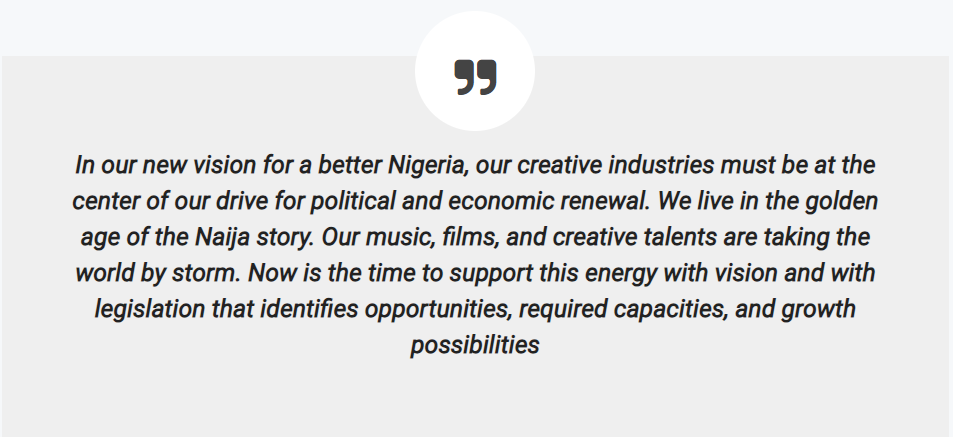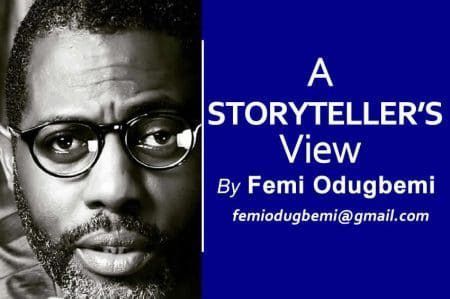Breaking the Mould - Creativity and national development
)
A keynote presentation at the 51st Annual General Meeting of the Association of Advertising Agencies of Nigeria AAAN held on 19 July 2024 at the Cultural Centre Abeokuta.
Distinguished Ladies and Gentlemen, [All protocols observed]
THANK you for the opportunity to discuss the theme “Breaking the Mould – Creativity and National Development.” In our technology-driven world, all development hinges on creativity and innovation. As George Lois aptly put it, “Creativity can solve almost any problem…because the creative act, the defeat of habit by originality, overcomes everything.” Real innovation works best when a compelling narrative connects creators with consumers, shapes understanding.
inspires vision, and instills ethical guidelines prioritising society’s common good. Storytelling, therefore, is a crucial tool for national development because it fosters the understanding and acceptance of new ideas and the promise of a better tomorrow.
Stories are more than entertainment; they form the foundation of our identities, values, and aspirations. Remember how the popular Nigerian movie, “The Wedding Party,” became a cultural phenomenon. Released in 2016, it not only broke box office records but also painted such a vibrant picture of Nigerian culture, showcasing our unique blend of traditions, humor, and resilience.

This movie didn’t just entertain; it united audiences across different demographics, offering a shared experience that fostered a sense of pride and belonging. In the context of national development, storytelling is “imagination engineering.” It is about creating compelling narratives that connect individuals to a shared vision of the future, promote national unity, and encourage active participation in societal growth. It leverages the soft power of media, arts, education, and cultural initiatives to reimagine and reconstruct our mindset, inspire and influence collective behaviors and actions. It involves using storytelling, creative arts, and innovative thinking to foster cultural identity and drive change. It is storytelling that aligns the dreams and efforts of individual citizens and institutions of state into a unified national vision.
Consider how countries like South Korea have also used storytelling through media to shape their national identity. The global success of K-pop and Korean dramas has not only brought economic benefits but also enhanced national pride and international influence. Similarly, Nigeria has the potential to tell compelling stories that can foster unity and drive development.
One of the unique strengths of Nigeria is our rich cultural diversity. With over 250 ethnic groups, each with its own language, traditions, and stories, we possess a wealth of narratives waiting to be told. By integrating the stories of our diverse tribes into our creative products, we can create a unique Nigerian story that resonates both locally and globally.
These narratives can highlight the beauty and strength of our diversity, turning our differences into a source of unity and national pride. Successful nations also harness love and loyalty to the country by promoting equity, equality, opportunity, human freedoms, and economic prosperity. It is narrative that fosters patriotism because its promises, in word and deed, serve the best interests of each citizen’s ambitions. Patriotism and love of country are not natural inclinations by place of birth; they are engineered with a narrative that is a solemn promise.
The ‘American story,’ for instance, is a simple promise: if you work hard and play by the rules, regardless of who you are, you can succeed. It is even said that any child can become President of the USA. In Nigeria, beyond symbols like the flag and national anthem, what vision of the future can a young child embrace today? What is the Nigeria story? What are the core principles and promises of this nation to a young child who is not born into privilege? Imagination engineering starts with children’s programming and school curriculums. Consider the example of the American children’s show Sesame Street. This show has been instrumental in shaping the educational landscape and cultural fabric of America for over five decades. It provided children with not just education but also a sense of hope and the belief that they could achieve anything. We need similar initiatives in Nigeria that speak directly to our children, embedding values of hard work, honesty, and patriotism from a young age.
In Nigeria, unanswered questions make patriotism and love of country difficult. When our young people dream of a better life elsewhere, they are responding to the absence of a Nigerian narrative and the deliberate construct of promise. The dream of a great nation demands intentional orientation. We have failed to create or sustain one for too long, and it has created a disconnect that breeds a loss of hope in our nation’s possibilities. Too many stories we tell of ourselves, especially on social media, reflect our worst instincts and lack imagination for our future. Common phrases you read on social media like "Nigeria happened to me" or "Nigeria is a jungle" describe scales of unfortunate and unfathomable negativity. This mindset may be our biggest hurdle to harnessing our collective talent and creativity for national development, especially among the millennials and Gen Z, who are the segment of society we most need now to work for a better Nigeria.
Nigerians need to believe again. We need hope.
Our creative industries—advertising, film, music, literature, and art—are pivotal in shaping that narrative. Our creative industry is our soft power. Today we live in the golden age of creative expression in Nigeria. Nollywood, afrobeats, our art, and our literature all have global acclaim and following. We have the talents, tools, and technology to play a vital and pivotal role in shaping a "Nigeria story" that foreshadows a glimpse of an inclusive nation of equity and possibilities. We need our literature, films, music, and artistic products to model and reflect our best development hopes and the right characters in leadership. We need to better define the Nigeria we want to build and why it promises the best life and opportunities for each of us. It is the job of our political leadership to know that beyond building roads and bridges, we must build belief and agency in the Nigeria story. Now more than ever, we need to foster cohesion and civic engagement. That is the real pathway to sustainable hope and national development.
Imagination engineering is also essential to walk us through the now. There are so many dark narratives of doom and gloom that evoke the specter of the pre-civil war media space of the 60s. Ethnic champions and fifth columnists are all over the place, spewing narratives of division and hate that need to be confronted with a parallel narrative of hope and healing. It is through our storytelling and creative expressions that we can safely process, understand, and negotiate our many disagreements and challenges. It is how we can safely re-educate on the promise of our nationhood and reduce ignorance to improve our national debates.
The newly created Ministry of the Creative Economy holds vast potential in this journey. It ought to be its remit to champion and incentivise creative production that speaks to a positive evocation of what is the Nigeria story. The Ministry needs a Marshall Plan to recruit creators in every segment of the creative industry to the cause. Nigeria’s advertising industry is the most experienced and sophisticated sector of our creative economy. It has the unique ability to reach wide audiences using all the tools of storytelling, visual appeal, and emotional resonance to shape public perception and influence behavior on a large scale. Its manifest expertise is perception management. Every sector of the creative industry—art, literature, film, photography, music, dance, theatre—easily converges in advertising. And with it, they shape the emotional.
connections to brands. We need to tap into that to rebuild brand Nigeria too. Certainly, there must be a pronounced strategic partnership between the Ministry of the Creative Economy and the Association of Advertising Agencies of Nigeria(AAAN).
It is necessary and it is urgent. This collaboration should focus on creating and funding projects that promote national values, encourage civic engagement, and highlight the benefits of active citizenship. It is a collaboration that can also develop public-private partnerships to provide financing and distribution gateways for all of the creative sector. This will strengthen the capacity of our creative industries to produce high-quality content that promotes national development goals.
One of the most impactful contributions that our creative industry can make to national development right now is to help us bridge the divides and rebuild a sense of community. We must depoliticise ethnocentric identity. We need to promote inclusivity and mutual respect among our different cultural, ethnic, and social groups. And we need to break down stereotypes with campaigns that emphasise common values and the common goals that can unify us. We also need creative campaigns that highlight an ethical compass and the importance of transparency and accountability in both our public and private sectors. We have an ethical crisis as a nation.

Virtually every news headline showcases the abyss we have fallen into in terms of individual responsibility in our public and private lives. We especially need to decry the damage to our nation’s image by the detrimental effects of corruption and impunity in our society. We need storytelling that emphasises the values of honesty, responsibility, and ethics, and role models who exemplify and pursue ethical paths in their professional and personal lives.
In addition to traditional media, technology and smartphones can play a crucial role in this conversation. With over 100 million smartphone users in Nigeria, we have a unique opportunity to reach and engage a vast audience directly. Social media platforms, apps, and digital storytelling can disseminate positive narratives, showcase success stories, and promote civic engagement on an unprecedented scale. For example, the #BringBackOurGirls campaign demonstrated the power of digital activism and global connectivity in raising awareness and mobilising support for a critical cause. Harnessing this digital power can amplify our efforts to engineer a new Nigerian narrative and foster national development.
In our new vision for a better Nigeria, our creative industries must be at the center of our drive for political and economic renewal. We live in the golden age of the Naija story. Our music, films, and creative talents are taking the world by storm. Now is the time to support this energy with vision and with legislation that identifies opportunities, required capacities, and growth possibilities. Brand Nigeria needs deliberate investment and a narrative architecture to make our creative impulses a key driver in nation-building.
Thank you.
Odugbemi, fta, is founder/CEO Zuri24 Media Lagos.
---
#FeaturedPost
)
)
)
)
)
)
)
)
)
![Kunle Afolayan [Pulse]](https://image.api.sportal365.com/process/smp-images-production/pulse.ng/12082024/99a2d860-d234-464c-98ff-95edb6ff675a?operations=autocrop(236:157))
)
)
)
)
)
)
)